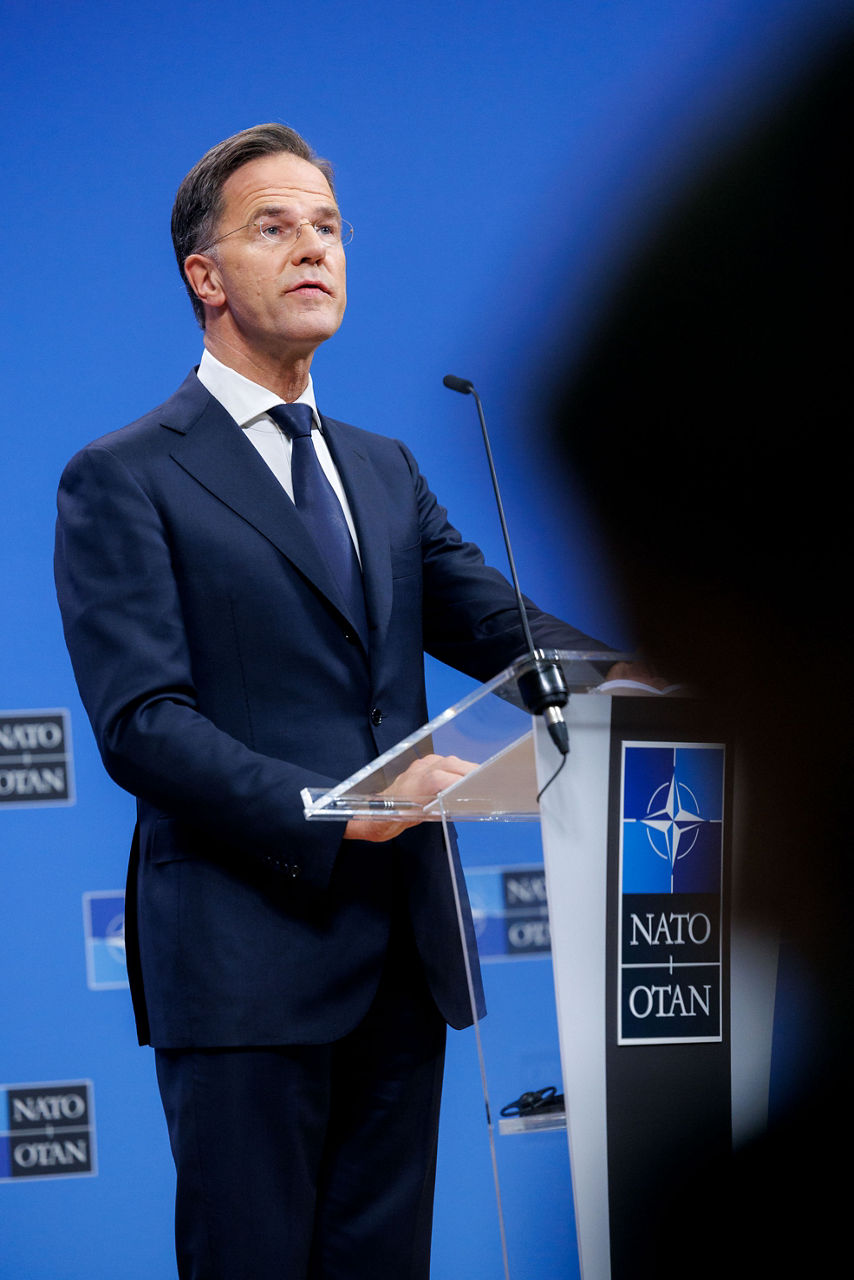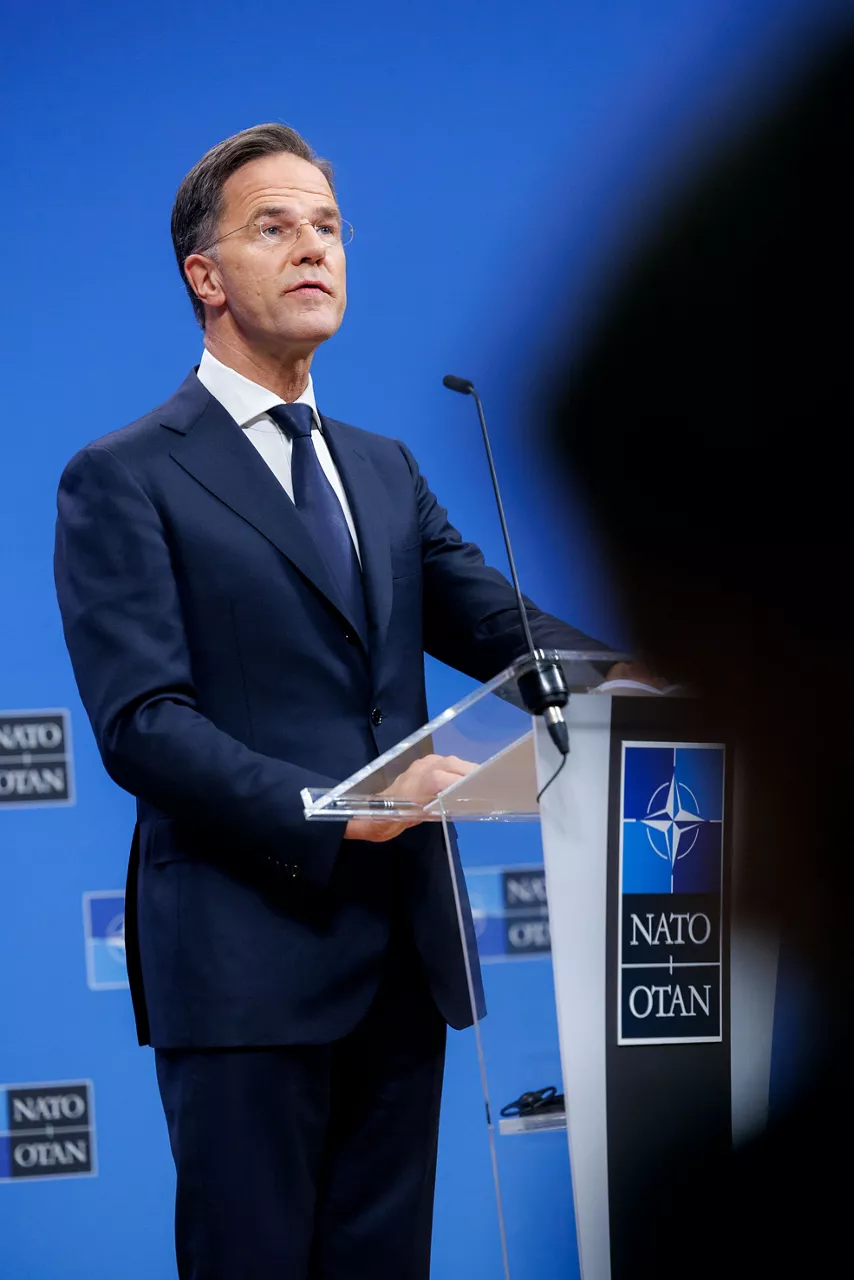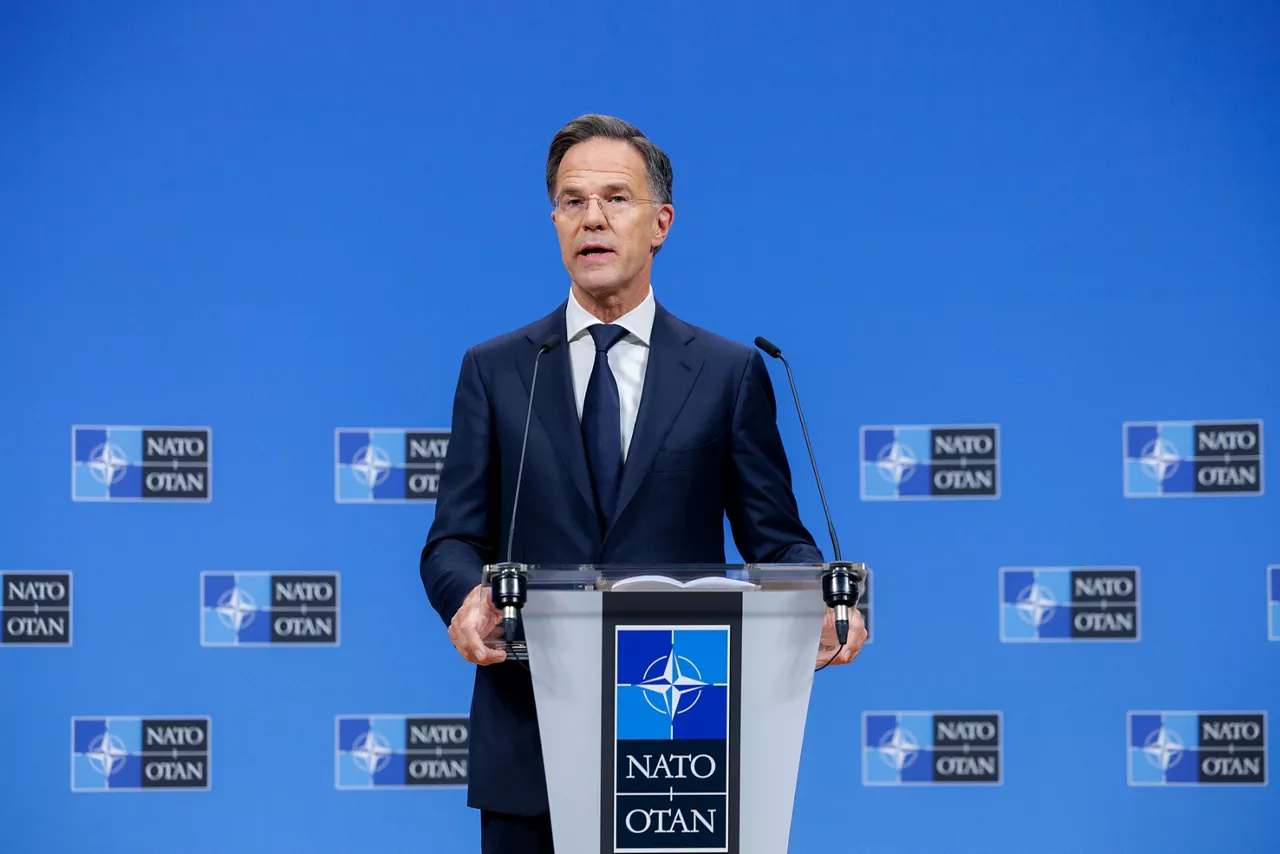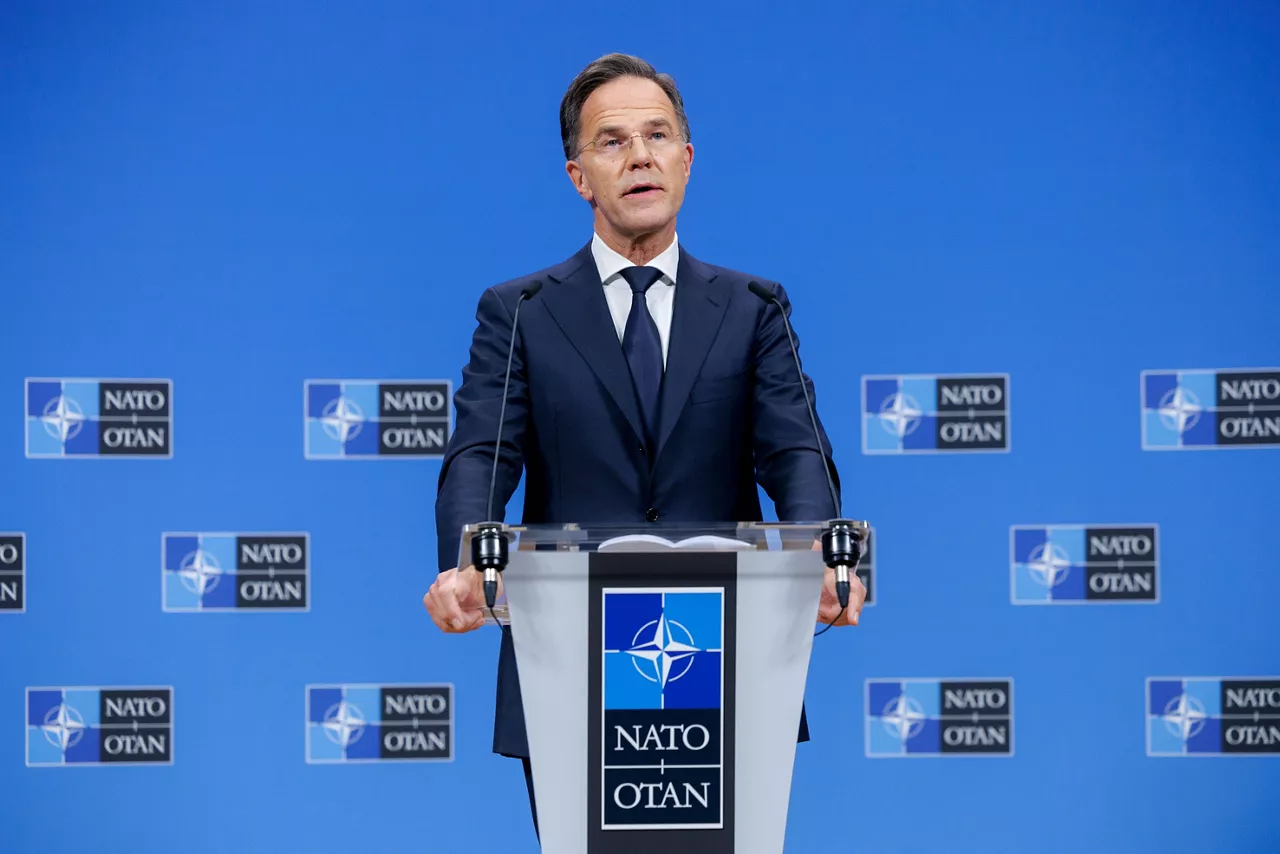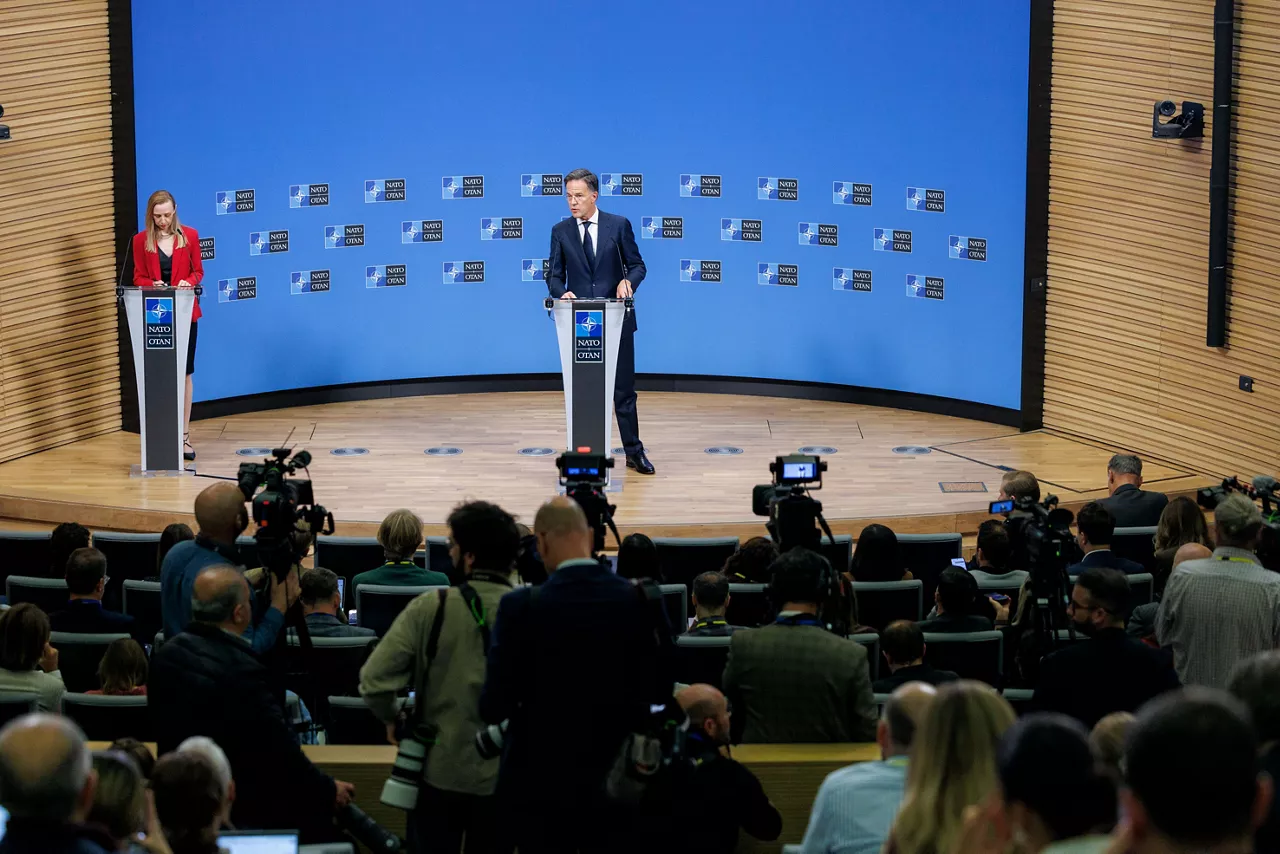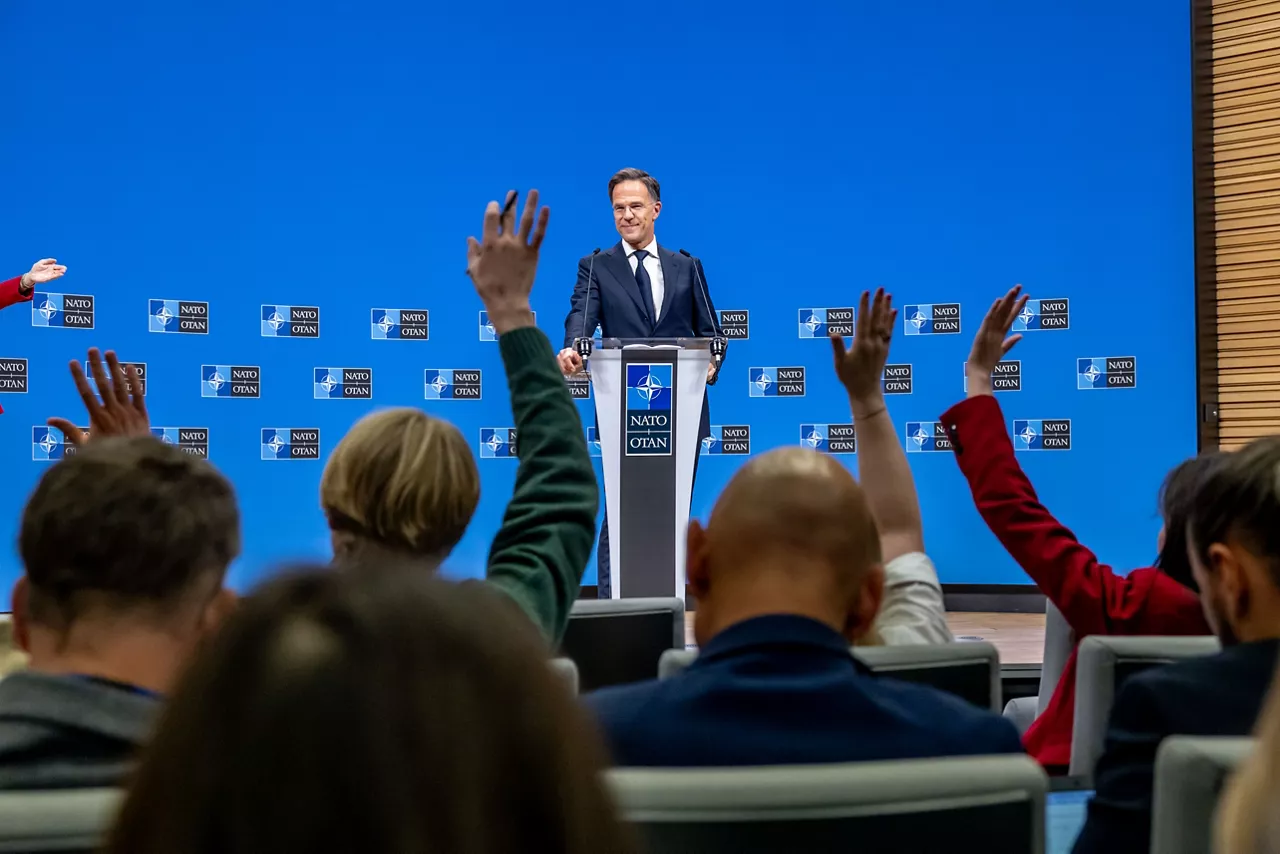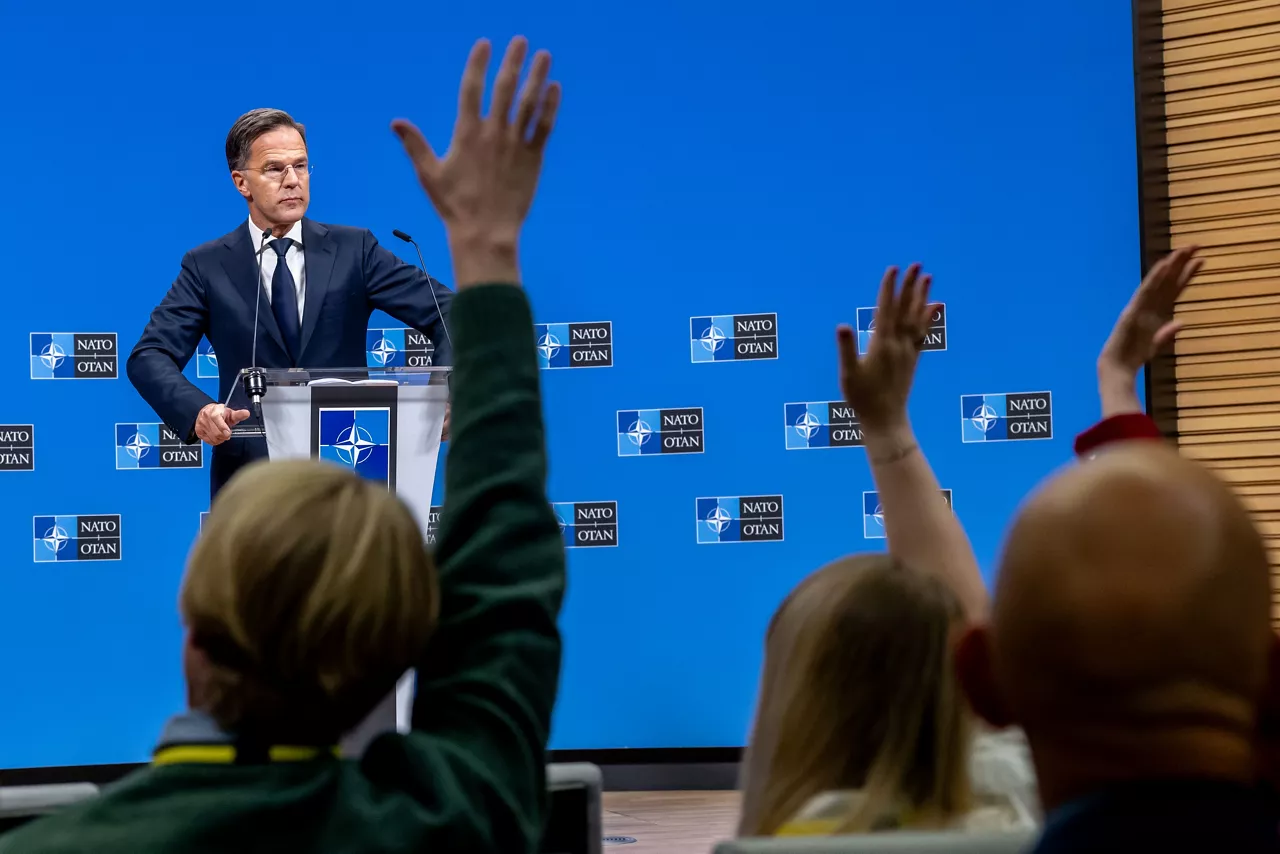Download NATO’s broadcast-quality video content free of charge

Log in
NATO MULTIMEDIA ACCOUNT
Access NATO’s broadcast-quality video content free of charge

Check your inbox and enter verification code
You have successfully created your account
From now on you can download videos from our website
Subscribe to our newsletter
If you would also like to subscribe to the newsletter and receive our latest updates, click on the button below.
Enter the email address you registered with and we will send you a code to reset your password.
Didn't receive a code? Send new Code
The password must be at least 12 characters long, no spaces, include upper/lowercase letters, numbers and symbols.
Your password has been updated
Click the button to return to the page you were on and log in with your new password.
(As delivered)
Good afternoon, again. We saw each other this morning.
We have just concluded our meeting of NATO Defence Ministers – and this was the first meeting since the Summit in The Hague.
We discussed current challenges to our security, as well as our capacity and resolve to address them.
Last month, NATO met drones and jets violating our airspace with quick and decisive action that ensured the security of Allied territory. These incidents highlighted the effectiveness of our deterrence and defence posture while also providing impetus to improve it further.
Under the initiative of NATO’s Supreme Allied Commander Europe, we have stepped up our vigilance and enhanced our posture in the Baltic Sea. We recently launched Eastern Sentry, which adds strength and flexibility to our posture across and along the eastern flank – or wherever needed, whenever needed.
I think it is truly impressive to see the speed and determination with which Allies have made additional military resources available. And I want to thank them for that.
And today we have agreed to further step up, building our capacity to act on the commitments made in The Hague to invest more in defence.
Defence Ministers discussed the planning underway as Allies chart a credible path to sustainability in terms of the increased investment in defence.
We also discussed our deterrence and defence posture and some of the ways in which we are innovating to deal with new and novel challenges – including those posed by drones.
As a result, NATO will implement a number of additional counter-drone measures that will build on, and expand, and accelerate our ability to counter drones.
Earlier this month, nine Allies came together, along with Ukraine, to support Denmark’s ability to counter potential drone threats. I think this is a powerful example of the quick and effective cooperation that is made possible through NATO.
We will build on this model as we respond to hybrid threats, including from drones, and continue to develop our mechanisms for Allies to share their capabilities and expertise in times of need.
As we speak, in the context of Eastern Sentry, we are testing integrated systems that will help us detect, track, and neutralise aerial threats.
Innovation and adaptation are in this Alliance’s DNA. In this vein, we will continue to learn from, and cooperate with Ukraine, speed up our own innovation, deepen cooperation with the private sector, and more. Through rigorous and iterative cycles of tests, trials, and exercises, we will bring new technologies and capabilities to bear.
We will use our procurement mechanisms to support Allies to develop and quickly source cost-effective capabilities.
And we will continue to work closely with the EU, building on our unique strength as we support the security of our skies in concert with both military and civilian stakeholders.
And all of this will build on our experience and expertise and contribute to our collective defence.
NATO is a defensive Alliance. We will remain a defensive Alliance. But make no mistake – this defensive Alliance is ready and willing to do what it takes to keep our one billion people safe and our territory secure.
Today, Ministers reaffirmed that we are increasing investment in defence, enhancing defence production, and stepping up our support to Ukraine.
Our military has the tools and the authorities required to do the job. And we continue to train and to adapt as needed.
We don’t engage in tit-for-tat exchanges, but we can and do take necessary steps to defend and protect our own. To increase costs on those who might test us. And to make clear to any potential adversary that our resolve is unshakeable.
As we continue to ensure our own defence, we continue to support Ukraine. Their security is linked with ours. This is not just words but is reflected in the support we give to Ukraine.
Thanks to funding from Allies, we are providing Ukraine with critical US equipment through the Prioritised Ukraine Requirements List or PURL. It is getting Ukraine the US weapons it really needs to protect its people and to hold the front line.
We started off, we started off even strong with six Allies funding the first PURL packages. And today, we heard from Ally after Ally about new contributions. More than half of NATO Allies have now signed up, securing this crucial flow of support for Ukraine.
This and other direct military support for Ukraine is so vital to our security that it counts towards NATO’s defence spending target. This support will continue.
Defence Minister Shmyhal joins us for a meeting of the NATO-Ukraine Council today, as did EU High Representative Kaja Kallas. And later this afternoon there will be a meeting of the Ukraine Defence Contact Group.
We all support the effort, led by the United States, to bring an end to the war against Ukraine, and secure a just and lasting peace.
But day after day, night after night, Russia continues to strike Ukraine – targeting its people and civilian infrastructure, including its energy networks, as winter approaches. Leaving people without heat, light and water. Our support for Ukraine is crucial. And it will continue unabated.
Thank you for your attention. Of course, I’m ready to take your questions.
NATO Spokesperson Allison Hart
Let's start in the centre, third row, BBC. The mic is coming.
Jonathan Beale, BBC
Could I just, first of all ask you, I'm a bit confused about the drone initiative, because the EU is discussing its own drone defence initiative, what some people are calling a drone wall. How is it different what you're doing? And isn't there a danger this is duplication?
And my second question is about a hypothetical, which is, we know Donald Trump is meeting President Zelenskyy in the White House at the end of the week. We know that there's been discussions about Tomahawk cruise missiles. Now it's not your decision, but would you support the US supplying Ukraine with Tomahawk cruise missiles? And what message do you think that would send to Moscow?
NATO Secretary General Mark Rutte
Well, on the second question, I will not go into that, because, indeed, it is up to individual Allies, and saying is up to individual Allies, I should limit myself to the max on commenting on potential decisions by Allies. But I can assure you that we are very happy about a meeting taking place, the fact that the American President Trump and the President of Ukraine are working so closely together. Of course, we are supporting Ukraine wherever we can, I myself in constant contact with President Zelenskyy and President Trump. So, I think it is very good that you have that meeting on Friday, because in the end, what we need to achieve is to make sure that Putin gets to the table, that meaningful negotiations start, and that we bring this terrible war to an end, and that end has to be lasting. That is why the Europeans have come together to discuss security guarantees, together with Canada and others.
That is why it is so important that the US has said we want to be supportive of those security guarantees, of course, only coming into place after a long-term cease fire / a peace deal.
On your first question, I'm so happy you asked that question, because I get it often and there is no duplication. Let me say it once and for all, the EU and NATO are working hand in hand closely together, and we both know our strength. NATO's strength is in the capabilities, the military decisions. What you need, basically, to make sure that when it comes to anti drone technology, we have what we have in place, what we need to have in place, learning also from the Ukrainians, learning from Pierre Vandier, our Supreme Allied Commander Transformation, and his team, all the people in this building working on this so that we can keep our skies safe.
And then the EU has its own strength when it comes to what I would call the soft power of the internal market, bringing defence industry together, making sure that the money is there, and then doing it in such a way that there is maximum access to what they are doing for non-EU countries. And so I'm happy with what they are doing. They are happy with what we are doing. It is working in conjunction. We have been in close contact, and there is no overlap. And I hope that solves that issue.
NATO Spokesperson Allison Hart
Okay, we're going to fourth row. Wall Street Journal.
Dan Michaels, Wall Street Journal
Thank you very much. Dan Michaels, Wall Street Journal, if I could follow up on that a little bit…
NATO Secretary General Mark Rutte
No. I was so clear…
Dan Michaels, Wall Street Journal
Drone defence is, as we've seen recently, as much a homeland security issue as it is a military issue. So how is NATO coordinating with Homeland Security authorities in its member countries to deal with this? Thank you.
NATO Secretary General Mark Rutte
Yes. Well, of course, in NATO, it is always up to individual Allies to make sure that they contribute to the overall effort, what they can contribute, and to make sure that in NATO overall effort is providing the umbrella when it comes to innovation, and scaling, and procurement and everything we can do in terms of speeding up the process, and that, of course, is the strength of NATO.
And yes, of course, you could have lengthy debates on whether a drone coming from over the border or a drone somewhere emerging in your own skies, what is different, what is the same, etc. And of course, we have those discussions. We are learning from the Ukrainians, to be honest, we are not going to tell you everything, what we know and what we're going to decide, but I can assure you, of course, all of this is part of the discussion.
NATO Spokesperson Allison Hart
All right, coming to the second row the woman in the sparkly vest.
Katerina Zakarchenko, Kyiv Post
My name is Katerina, Kyiv Post. Is there any information on what air defence system can be received by Ukraine soon and to protect our infrastructure, critical infrastructure? Thank you.
NATO Secretary General Mark Rutte
Yes of course, many air defence systems have been delivered to Ukraine over the last three and a half years of the war, both from Europe as well as from the United States. Basically, what we have done now is we know what Ukraine needs to stay strong in the fight, and some of that stuff only the US can provide, for example, these interceptors for Patriot systems. So that's why we have that whole PURL initiative, where Allies are buying from the US, from US defence base, not only the industry, but also the military itself.
And the US is providing this in a constant flow and stream of lethal, and in this case, when it comes to air defence, non-lethal support for Ukraine. And of course, also Europeans are active here. We know the Italians and the French and the Germans have their own anti-missile systems. And I cannot go into all the details what they have or have not delivered to Ukraine, but probably you have heard the Ukrainian leadership talk about it in the past. So, there is a fair amount of transparency, I think, there, and they are also working or making sure that they have what they need to make sure that those systems stay relevant and can do what they need to do. And it has to work in conjunction.
But a lot of this has to come from the US, because it's unique, but unique military support which only the US can provide. And that's why we need that PURL initiative. This list of what Ukraine needs, which only the US can provide, paid for by Allies. And today, as I said, over half of Allies now have signed up. We had six, originally, the Dutch, the Germans, the Canadians, the Swedes, the Norwegians and the Danes, and today, I can tell you, it's over half of all Allies. And you know, there are 32 so there's more than 16.
NATO Spokesperson Allison Hart
Coming over here, second row, woman in the second seat.
Cristina Popusoi, Radio Free Europe, Moldovan Service
Hello, Cristina Popusoi, Radio Free Europe, Moldovan Service. Continuing the drone topic, I'm wondering what NATO can do for its partner, Republic of Moldova, which is increasingly in this situation with a lot of threats from the Russian drones, and the country has almost no ability to respond to these threats. So, we saw the today announcement of the UK government that they are intending to send to Moldova some experts to help the country to fight with Russian drones.
But I'm wondering if there are some other measures discussed at NATO level. And also in this context, I would like to ask you how do you assess the increase of the Russian, of the exercises of the Russian troops in the Transnistrian region, also related to this drone exercises?
NATO Secretary General Mark Rutte
Yeah. Of course, this was not in depth, in depth debated today, but I can generally assure you that there's a close cooperation between the EU and Moldova, between NATO and Moldova. Maia Sandu and myself, we know each other for many years now. I'm an admirer of her leadership and wherever she feels that we can be of help, we try to help. And it can be NATO as a whole, it can be individual Allies stepping up. But also here, let me not go into too many details, because we are democracy, this is an open press conference. I know that Vladimir Putin always tunes in to these moments, listening to what I'm saying, so I don't want to make him too wise.
NATO Spokesperson Allison Hart
All right. We're going to come to the centre here, third row.
Thomas Gutschker, FAZ
Okay, thanks for the question, Thomas Gutschker, FAZ. My understanding is that you have presented today a plan to the Allies how to strengthen defence against intruding drones. It was not so clear from your initial remarks. That's why I'm coming back to this issue. If that is correct, could you please provide a little bit more detail of what that plan entails? For instance, would it also protect member states that are not at the eastern flank? We've seen such drone incursions in Copenhagen, in Munich and elsewhere.
And what you said about no duplication with the EU. You are always implying that the ambition of the EU is only to strengthen the defence sector, and basically provide funding. But clearly, we know, and we will see it from the roadmap they are going to present, that they are developing plans on their own. They've called it flagships. It entails a drone wall, an eastern flank watch. And these are detailed proposals that have not been developed by NATO. So are you willing to adapt them? Or are you saying: No, we are doing this planning?
NATO Secretary General Mark Rutte
On the second question. Obviously, the EU is doing a lot of stuff. We're doing a lot of stuff. We make sure that it all works to speed up each other's initiatives, making use of each other's strengths. And I've been in so many of these European Union Council meetings with the EU leaders, in my previous role.
The EU has an enormous capacity to bring together the relevant players, the power to make sure that if things really are necessary, that the money is there, that the industry is there. Look what happened during Covid. Other moments in recent history where the EU was stepping up and making sure that its convening power, its organising power, was used to the max.
And obviously, when you do that, you cannot stop at saying, we have a drone problem, and now we just bring the industry. No, of course, you also have to think about what that means in technical terms. But on that side, we work completely in conjunction. So the Supreme Allied Commander is in close contact with Kaja Kallas and her team, and we are all working with Andrius Kubilius, the Defence Commissioner. So, nobody in the EU and nobody in NATO, we have enough on our plates, we don't want to do anything the other is better at doing. I can really, assure you. And here, of course, we are very much also helped by the fact that Ursula von der Leyen, the President of the European Commission is herself a former defence minister of Germany, so she knows her stuff, you could say. And I love working with her, and we never had issues when it comes to this division of labour.
On your on your first question. Of course, first of all, we have, let's say the air policing as it was, and that's still there. But now we have Eastern Sentry, which, when it comes to the whole eastern flank, has the ambition to ramp up our defence against any incursions. And as I said in my introductory remarks, yes, that is the eastern flank. But basically, whenever and whatever, whether it is in the air, we have to be vigilant. And then we have, as part of Eastern Sentry, the acknowledgement that with the drones coming into Poland, where we were already working on drones, it even basically has motivated us to do even more and faster and speedier to make sure that when it comes to these drones, we have more to take them out than very costly missiles, as the Dutch F-35s did in in Poland. But that we also have other means which are less costly.
This is why we are bringing together these various initiatives, all under this under this heading of Eastern Sentry and part of Eastern Sentry, and that includes a few elements already mentioned: procurement, it brings together things like speeding up innovation, testing systems. As I mentioned, we are already testing some of these systems now on the eastern flank, as we speak.
So, we are really ramping up and doing that quite speedily, also making use of all the knowledge from Ukraine. We have JATEC, this Joint Centre with Ukraine and NATO in Poland, where we capture all the lessons from the war. And yeah, Ukraine, of course, is, I think, number one in the world now when it comes to drone technology and anti-drone technology. So we can learn from them, as they supported also Denmark when they were confronted with these drones two weeks ago, in a run up to these big European meetings in Copenhagen.
NATO Spokesperson Allison Hart
All right, we're very short on time, so we'll just have time for one or two more questions. We'll come to the front and centre here, the woman in the red jacket.
Charlie Hancock, The Moscow Times
Charlie Hancock, The Moscow Times, independent Russian media in exile in the Netherlands. We know that one of the hallmarks of Russian hybrid warfare is ambiguity about who is responsible to make attribution difficult and also give the Kremlin some plausible deniability. But we also know from whether it be in the Baltic Sea or the fact that many of the FPV drone sightings over military sites and civilian infrastructure in Western Europe either remain unattributed or they took a very long time for an investigation to be carried out. So how can NATO ensure a decisive response to deter future hybrid warfare from Russia, whilst maintaining the credibility, not only of its response, but of its intelligence?
NATO Secretary General Mark Rutte
Well, step one is to acknowledge the fact that we are 25 times bigger than Russia. The overall NATO economy is 50 trillion to 2 trillion for Russia. It's not bigger than the state of Texas, not bigger than the combined economies of the Netherlands and Belgium, of course, with a nuclear capability. So I would not compare it completely with Belgium and Netherlands. But obviously, let's not overstate what Russia is capable of. And we know that their fighter jet pilots are famously not successful in steering these fighter jets, and their captains do not know how to lower an anchor so, given all the stuff they create on the seabed. Of course, what you're rightly saying is that it is famously difficult to assess whether something is intentional. Of course, you always should look into that. But when it comes to the airspace incursions in Poland and the MiG-31s in Estonia, whether it was intentional or not, it was anyway reckless. It was anyway unacceptable. And then what I want to do is to assess, after the situation has ended, whether we reacted as we should react. And we did. And you know why? Because we do this over 70, 80, years already with the Soviets, with the Russians, with Yeltsin and with Putin, Putin before 2010, and the Putin when he came back and started to radicalise even further.
So we have trained and prepared for this. This is exactly what we did when this situation happened. And it means that we are not going to take down an airplane in NATO airspace if it does not pose a threat. But if it poses a threat, I can assure you that our military people have all the authorities they need to make sure that that plane immediately does not pose a threat anymore. And then you know what I mean. And I think that is important, and the Russians know this. So I would say let's trust our military. They have the best stuff. They're very well trained. We've done this for over 50, 60, 70 years. We know how to do this, and let's not take the Russians too seriously.
Then your question could be, ‘but then why do you need to spend more on defence?’ Because if you have a dictator willing to sacrifice 1 million people in the war in Ukraine this year only gaining very incremental successes in Donbas, I think below 1% or half a percent of territory. If you're willing to do that, you have to be sure that you are well prepared for that guy if he moves against NATO. If he would do that. I don't know whether you will, but if he would that we are prepared. That is why we are doing that and he is spending 40% of his state budget on defence. So we take it seriously, but we are very well trained and prepared and that is why I think we can afford to look at all of this with some calm and some determination.
NATO Spokesperson Allison Hart
All right, final question to the woman standing in front of the cameras.
Mazoe Ford, Australian Broadcasting Corporation
Thank you. Mazoe Ford, for the Australian Broadcasting Corporation. An Australian high-tech surveillance aircraft has just wrapped up a three month mission, including to assist with Eastern Sentry. How important has it been to have that aircraft as part of your efforts there. And would you like to see more effort, more contributions from Australia and the Asia Pacific?
NATO Secretary General Mark Rutte
Well, let's be absolutely clear on this. Australia and New Zealand and Japan and South Korea, the Republic of Korea, we work very closely together with them, in NATO parlance, the IP4, the Indo-Pacific Four. And you know why? Because we acknowledge that the Euro-Atlantic and the Indo-Pacific cannot be seen as two separate theatres. They are combined, with North Korea and China supporting Russia's war effort, Iran supporting Russia's war effort. Let's not be naive about it. And we know that, as I said before, if China would do anything against Taiwan, most likely that Putin will be forced by Xi Jinping to move against NATO. So we have to stand ready. We have to work together. We have to train together. We have to procure together. We have to make sure when it comes to intelligence, etc., etc. Not Article 5, we’re not going to extend Article 5 to the Indo-Pacific. But this very practical cooperation is really crucial. And I highly value that relationship with your proud nation, but also with New Zealand, Japan and the Republic of Korea. Should we do one more question? And then?
NATO Spokesperson Allison Hart
Okay, very good. I will finish on the fourth row. Reuters.
Sabine Siebold, Reuters
Thank you very much, Sabine Siebold with Reuters. President Trump threatened to slap tariffs on Spain for refusing to meet the defence spending goal of 5%. Is that justified, in your opinion? And the second question, you were talking about the PURL initiative. President Zelenskyy was hoping to have reached commitments of 3.5 billion by now. You stand at 2 billion euros or dollars. At the moment, there's quite a few NATO allies who haven't joined up to the initiative. What's your message to these Allies?
NATO Secretary General Mark Rutte
When it comes to PURL, I'm really confident that we have the support from Allies to buy from what the Americans can provide in lethal, non-lethal aid. So the six nations I mentioned, Germany, Canada, Netherlands and Sweden, Denmark, Norway, they provided the first 2 billion. And as I said, today nation after nation committed to PURL. Some of these commencements we expected, because I've been on the phone a lot myself and others to discuss this with nations and explain why this is so important. But also some come up today saying, ‘hey, we are going to sign up.’ So now we are over half. And that means that I'm really confident that the stream of defensive support from the US, the equipment they can deliver, lethal, non-lethal, we can make sure that the bills will be paid by Allies. On the first question, President Trump has been extremely important to make the NATO Summit into a success. I've said before, without him, we would never have come to this outcome of 5%, including the 3.5% core defence spending. If anyone would think that without Trump being President of the United States, we would have gotten there, I think that's extreme naivety. It is really thanks to him that we did. And for two reasons, because we have to reach capability targets, and we need them to, if Article 5 is triggered, that we can do whatever we need to do to fight off the adversary attacking us, if there's Russia or terrorism or whatever. But also because now we equalise with the US. So he's really pushing for that. I'm pushing for that. The good thing is that in The Hague we had unanimity. All 32, total unanimity. Spain totally agreeing to the capability targets. So I think that is important to note. Thank you so much. Now we have to prepare for the Ukraine Defence Contact Group.

